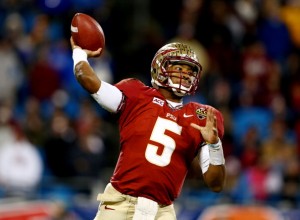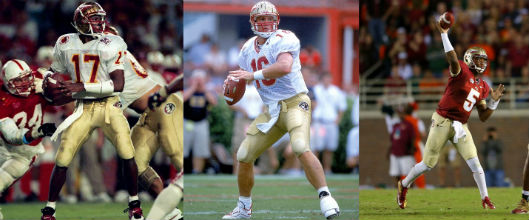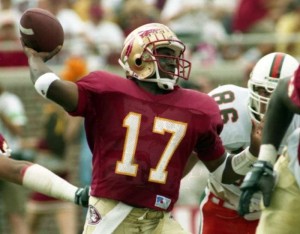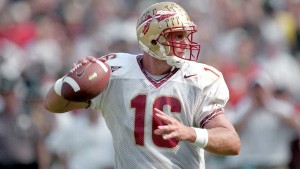Last week’s Seminole Stand-Off put two electrifying running backs on the scale to determine which would be selected for an FSU All-Time team. Amp Lee was chosen over Greg Jones for his almost unreal ability to find the end zone in all types of ways, though no one would deny both left unique legacies at Florida State. Readers also gave Lee in the nod with 68 percent of the vote in our online poll. This week’s edition is a bit of special one as we try to compare the three greatest quarterbacks in Seminole history and determine which one will get the nod.
Charlie Ward, Chris Weinke, Jameis Winston. The three W’s in FSU history that signal quarterback greatness (not to mention Casey Weldon) all have Heisman trophies and all won a national championship during their time at Florida State. Thankfully because of these similarities, team accomplishments won’t be considered as much in this match-up since they all have outstanding awards on the resume’. It’s down to the stats and the eye test, whether for better or for worse.
Numbers of course need to be put in the context of the offenses. Ward for instance will have inherently lower numbers because of the era he played in. While it was still modern, Bobby Bowden’s offense in the early 90’s was different from Jimbo Fisher’s offense with Winston these past two years. So while Ward may have less volume stats than either Winston or Weinke, his numbers might still be more impressive. Key word “might”. That’s what this piece is partially trying to determine.
The same rules will apply: A player’s NFL career will not be factored into our analysis — we are strictly looking at college performance/legacy. We will attempt to compare players from similar eras as well, meaning you probably won’t see a Fred Biletnikoff vs. Rashad Greene breakdown. Finally, team accomplishments will certainly have a role but we will try to isolate a single player’s impact in order to make it fair.
Charlie Ward
It seems strange to say now, but one of the greatest quarterbacks in Florida State history started as a punter. Ward came to FSU in 1989 and punted in 11 games before being redshirted for the next season. After the 1990 year, the rumblings began about a hyper athletic quarterback that was ready to take the nation by storm. He sat one more year behind Casey Weldon — the 1991 Heisman runner-up — and then it was his time to shine.
Initially, Ward’s career got off to a bumpy start. In his first seven starts of 1992, Ward threw 15 interceptions and only 12 touchdowns. He was figuring out how to scramble, but still had three games where he was held to under 20 yards rushing. Finally things began to click for the quarterback who had shown so much promise even in his rough patches.
Over the final five games of the 1992 season, Ward threw for 12 touchdowns and three interceptions while running for over 300 yards and adding three more touchdowns. It culminated in an Orange Bowl victory over the Nebraska Cornhuskers and ended with a No. 2 national ranking. The Seminoles had found their star.
Charlie Ward’s 1993 season is the stuff of legends, so we won’t be reviewing it in full detail. Just know that his 31 total touchdowns to only four interceptions with almost 3,500 yards is an efficiency that has yet to be matched over a full season by any succeeding quarterback. He won every single award he was nominated for and then some. It was through him that FSU had both its first Heisman winner and first national championship.
His effect on the college game at large is still seen today. Ward’s athleticism allowed Florida State to institute what they dubbed a “fast break offense” which is now seen in modern “spread offense” teams.
The Seminoles could drive down the field without having to once huddle up for a play, which led to records in points scored, yards, and amount of plays. Ward was the man who enabled this to happen and who was able to execute the offense perfectly. For this, many players to this day owe him thanks.
Ward started two years and had an overall record of 23-2 with two ACC championships and two Orange Bowl wins, one of which was for the national championship. Here’s a fun fact: Nebraska’s Tommie Frazier went 33-3 in his career as a starter. Two of those losses were to Charlie Ward-led Florida State teams.
Chris Weinke
It’s unfortunate that Weinke sort of gets squished in between the two most prominent FSU Heisman winners. During his time at Florida State, Weinke rewrote the record books and led his teams to unprecedented success. While he may not have had the distinction of being the first to do so, his leadership was absolutely crucial in winning the 1999 national championship and participating in two more.
Like Charlie Ward, Weinke didn’t start at quarterback until later. As in, Weinke went to play minor leagues baseball before coming to Florida State in 1997 as a 25-year-old. Weinke first started during his sophomore year of 1998 after projected starter Dan Kendra suffered a preseason knee injury.
Weinke finished with 19 touchdowns and 6 interceptions, which all came in one atrocious game against N.C. State — his first road start. Unfortunately, the most prominent Weinke memory from the 1998 season was him suffering a major neck injury versus Virginia that prevented him from playing in the last two regular season games and the national championship. FSU lost to Tennessee 23-16, and one just wonders what would have happened if the Seminoles weren’t forced to start their third string quarterback.
The 1999 season was the first (and only) time a college football team has ever gone wire-to-wire as No. 1. Weinke was a large part of that. He increased his completion rate by 11 percent from 1998 to 1999 and truly embraced an offense that included Peter Warrick and Ron Dugans as his main receivers.
His final stat line was 25 touchdowns and 14 interceptions on 3,103 passing yards, but that doesn’t truly capture just how vital he was to the team. Weinke’s best game of his career came in the Sugar Bowl for the national championship against a Michael Vick-led Virginia Tech squad. He passed for four touchdowns and over 300 yards with only one interception as FSU downed the Hokies 46-29 to finish one of the best seasons in college football history.
While the 2000 season didn’t end the way the Seminoles wanted, Weinke elevated his game to yet another level to win the Heisman. His completion percentage, yards, adjusted yards-per-attempt, touchdowns, and passer efficiency rating all went up while his interception total went down.
The Seminoles’ only loss during the regular season was to Miami, a game where Weinke passed for 496 yards and three touchdowns with two interceptions only to see another iteration of Wide Right. FSU would then lose to Oklahoma 13-2 in the Orange Bowl for the national championship, but the Seminoles were without All-American wide receiver Marvin Minnis, who was deemed academically ineligible.
Weinke still holds the records for passing yards in a game, season, and career. He also still has the most career passing touchdowns with 79 and is in the top 5 for virtually every passing record you could think of at Florida State. His teams went 34-4 and played in an unprecedented three straight national championships while he racked up awards like it was nobody’s business. He knew nothing but success and raised the ceiling of just how productive people thought a quarterback could be.

CHARLOTTE, NC – DECEMBER 07: Quarterback Jameis Winston #5 of the Florida State Seminoles passes against the Duke Blue Devils during the ACC Championship game at Bank of America Stadium on December 7, 2013 in Charlotte, North Carolina. (Photo by Streeter Lecka/Getty Images)
Jameis Winston
The most recent Heisman winning FSU quarterback is the one still fresh in the memory of Florida State fans who saw his meteoric rise to stardom. Winston came in as a highly-touted freshman and redshirted his first year in 2012. Before the start of the 2013 season, he had separated himself from Jacob Coker and looked to be a (redshirt) freshman phenom. Nobody could have predicted what happened next.
Only one year after Johnny Manziel became the first freshman to win the Heisman, Jameis Winston led the Seminoles to an undefeated season and the national championship to go along with his myriad of awards. He threw for 40 touchdowns, 10 interceptions, and 4,057 yards at a completion clip of almost 67 percent while contributing over 200 yards and 4 touchdowns on the ground. Winston was at the helm of possibly the most prolific offense in not just Seminole history, but college football history as well.
His second season was underwhelming by comparison. The issue has been discussed over and over including on this website, and the general conclusion is that various factors caused Winston to regress a bit. Yet despite this, Winston still was able to lead the team to an undefeated regular season and third straight ACC championship with some magical moments along the way.
His final stats of 28 total touchdowns, 18 interceptions, and over 3,900 passing yards are only bad in the context of what he was able to do during his freshman year. Without Winston, Florida State doesn’t go undefeated and probably doesn’t come close. His exceptional late game heroics in the Oklahoma State and Notre Dame games in 2014 are as good as any in Seminole history.
In just two seasons, Jameis Winston was able to vault himself near the top of the record books at FSU. He has the most passing/total touchdowns and yards in a single season while also coming in second in career passing touchdowns.
There’s little doubt that Winston would have broken most of the remaining records if he stayed for one more season, but alas, the NFL Draft came calling. While his time with the team wasn’t without its controversy, many fans wish him well in the league and consider him the greatest quarterback of the bunch.
Winston’s Florida State teams went 27-1 and contributed to the program’s longest win streak ever with 29 straight victories. Two ACC championships with a national championship and a playoff appearance capped off one of the greatest careers a quarterback has ever seen. Jameis’ departure was very recent however, and his legacy could certainly change in the coming years.
Who’s The Choice?
Oddly enough, we haven’t even highlighted the famous plays from any player’s legacy. They all have their moments and it’s incredibly hard to see which one is better. Jameis had the Houdini escape and touchdown pass against Boston College in 2013, Ward had the game saver in Gainesville in 1993, and Weinke had the amazing play action fake to begin a rout of Clemson in 2000. None are without their highlights.
With all due respect to Chris Weinke, he is probably the first guy we can rule out of the race. It’s hard to eliminate the guy who probably had the best career of the three, but his accomplishments have some underlying reasons apart from him being a great quarterback. Weinke played on some of the most talented FSU teams in history and that included receivers named Peter Warrick, Snoop Minnis, and Anquan Boldin.
Nobody would deny that Weinke’s ability to air it out probably helped all three of those guys rack up the numbers that they did…but it also speaks to who was really leading the team. Ever wonder why Peter Warrick gets all the attention from the Virginia Tech game and not the quarterback who threw for gaudy numbers in a national championship? That’s partly why.
It is also by this criteria that we have to eliminate Jameis Winston from the running as well. Winston had amazing receivers during his Heisman run in Kelvin Benjamin, Rashad Greene, and Kenny Shaw not to mention tight end Nick O’Leary. Like Weinke, he is still an undeniably great quarterback who was at least partially responsible for their successes — but it would be foolish to say that he didn’t have much help in 2013.
The next season has a bit of debate that we’ve already gone over in previous articles so we won’t rehash it here. Overall, Winston proved to be a great quarterback who made the most of the talent around him. So this leaves one remaining.
The answer is clear when one looks at what Charlie Ward was able to do in two years time and how much of an effect he had on the game in general. Ward was the ultimate playmaker — his athletic prowess made sure that teams could not sell out on any single part of the offense. His top receivers during the national championship were Kez McCorvey, Matt Frier, and Kevin Knox.
McCorvey, Knox and Frier were all good receivers, but none of those names are really comparable to what the other two Heisman quarterbacks had, and yet he was able to produce similar results. Beyond just stats and records, Ward has a sort of mythos surrounding him. His bad games are almost completely forgotten because they were so unusual that fans almost blocked them out.
He was the penultimate leader with the trophies and numbers to back it up. It was because of him that Bowden and the FSU offense were able to institute the fast break offense and help revolutionize the sport as we know it .
Ward’s legendary status goes beyond the numbers and the on-field results. Charlie changed the game and the Florida State program in ways that make future quarterbacks forever grateful. All three men were amazing players who helped bring FSU national acclaim — but only one can be the selection.
Do you agree with the pick? Let us know on Twitter or Facebook or the comments below. If there’s any match-up you want to see dissected, make sure to mention it as well!






















